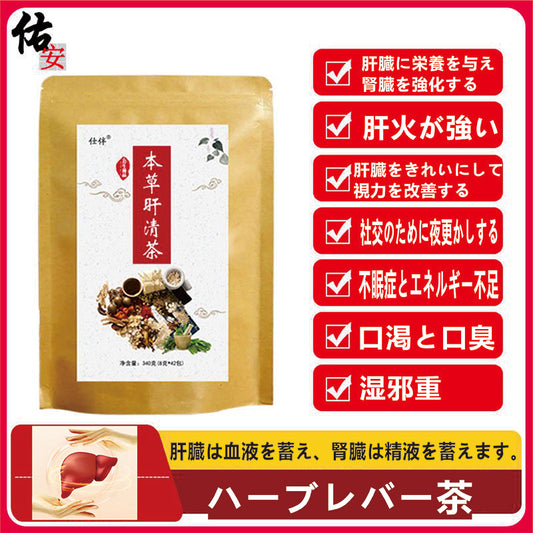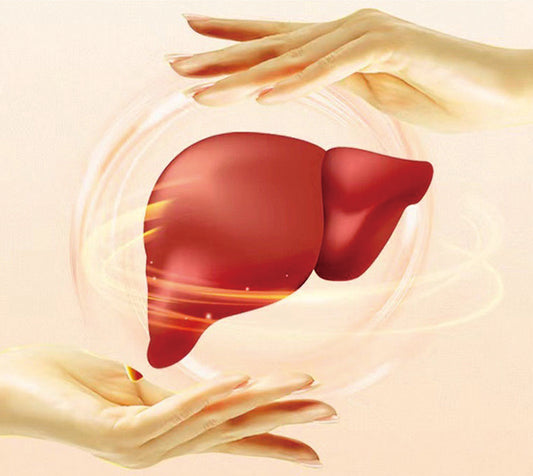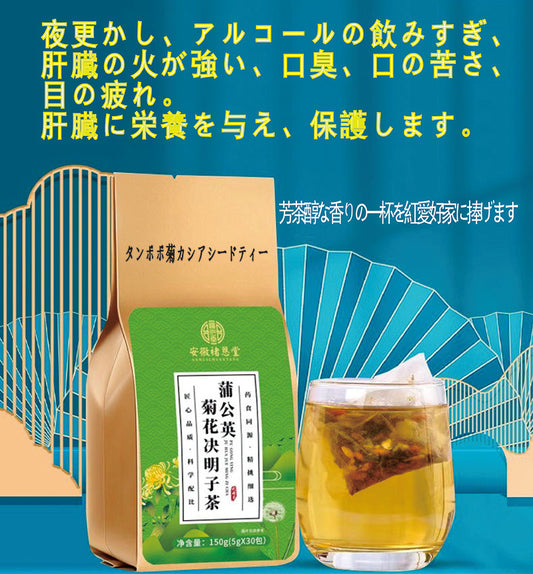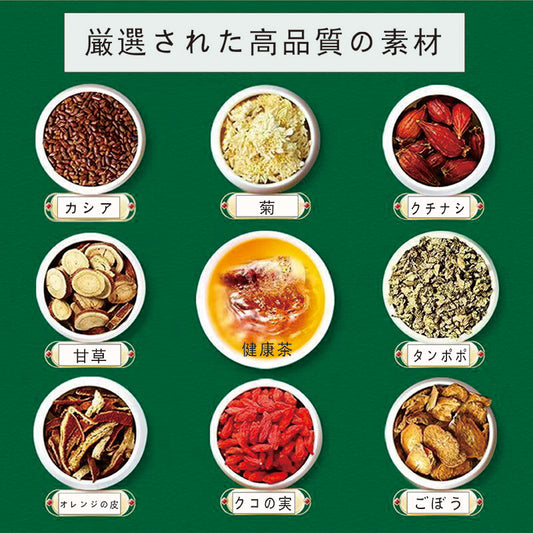-
Herbal Liver Tea
Regular price From ¥5,500 JPYRegular priceUnit price / per -
Ginseng, knotweed, goji, babao tea
Regular price From ¥9,450 JPYRegular priceUnit price / per -
Liver protection tea of dandelion, chrysanthemum and cassia seeds
Regular price From ¥9,450 JPYRegular priceUnit price / per
Collection: liver health series

Maintaining the health of internal organs in traditional Chinese medicine - liver chapter
According to the ``Yellow Emperor's Nei-kun・Su-问'', the liver is the general's office, and it is said that plans and ideas are born from here. The liver has the courage of a general, and is called the office of a general, and strategy is born from here. The liver is closely related to spiritual emotions, digestion and absorption, Qi and blood circulation, water metabolism, sex and reproduction.This article focuses on the liver and comprehensively explains the importance of liver protection in Chinese medicine. I will explain.
1. The liver stores blood and is called the blood ocean. Generally speaking, the liver has the function of storing blood and regulating blood volume. By storing blood, the liver maintains the balance of yin and yang in the liver and harmony with qi and blood. On the contrary, blood is the protection of the liver and the basis of the liver. Due to the decrease in blood flow, the blood circulation function within the liver decreases, and the liver's ability to absorb nutrients, metabolize, and excrete toxins also decreases. Much of the blood passes through the liver and is excreted from the body. During a woman's menstrual period, the liver helps regulate blood, and for this reason, in Chinese medicine, it is said that ``women have an innate liver.'' When the liver has insufficient blood reserves, the following symptoms are common: Due to lack of liver blood, the internal heat disturbs the mind, and there is a lack of blood to nourish the mind, and the most common symptoms are emotional roughness, irritability, anxiety and sleeplessness, dizziness, and ringing in the ears. Symptoms include a dark, dull complexion, dry eyes, blurred vision, numbness of the limbs, stiff joints, difficulty bending and stretching, muscle spasms, and trembling of the limbs. Women have low menstrual flow, delayed menstruation, and color of menstrual blood. In severe cases, menstruation may stop. When liver fire is active, the following symptoms are common: Easily irritated, dizziness, bitterness in the mouth, dry mouth, bleeding gums, nosebleeds, red and swollen eyes, oily skin, anxiety, inability to sleep due to anxiety, irregular menstrual flow in women There are many cases. Of the five organs, the relationship between the heart and liver The heart mainly produces blood, and the liver stores blood. The heart is responsible for the mind, and the liver is responsible for excretion and regulates mental emotions. Therefore, the relationship between the heart and liver is primarily considered to be both blood and spirit. On the blood side, the heart is the center of blood circulation throughout the body, and the liver is an important organ that stores and regulates blood. They work together to maintain blood circulation. Therefore, it is said that the liver stores blood and the heart transports it. When there is sufficient blood throughout the body, the liver has something stored in it that can regulate the blood flow. Depending on the needs of the body's activities, the heart also plays a major role. If the heart has enough blood, the liver will also have plenty of blood, and the yin blood stored in the liver will support the liver's yang. Therefore, when the blood in the liver is full and the liver receives nutrients, the excretory function of the liver will be normal, Qi and blood will flow smoothly, and there will be no stagnation of blood. Maintains normal cardiovascular function.
2. The liver controls the muscles, and its flowers are in the nails, and the liver, which is connected to vision, controls the muscles of the body. The book ``Su问・痿RON'' states that ``the liver controls the fascia of the body'' (including the fascia). Fascia is a tissue that connects joints and muscles and controls movement, and fascia throughout the body depends on nutrients from liver blood. Therefore, all human joint movements are related to liver blood. When the function of the liver controlling muscles is impaired, it is mainly due to insufficient yin blood, impaired excretory function, and stagnation of Qi flow. Clinical symptoms include trembling of the limbs, numbness of the limbs, muscle spasms, difficulty bending and stretching, limb spasms, angular pulling, and clenching of the teeth. Flowers on the nails The rise and fall of liver blood can affect muscle movement. "Nails are the flower of muscles." Nail refers to (finger) nails. Therefore, it also affects the growth and decline of your nails. If you have an abundance of liver blood, your muscles will be strong and your nails will be hard. With a lack of liver blood, the muscles become weak, and the nails become thin, soft, deformed and easily cracked. Therefore, in the ``Su'an and Wuju Generation'' it is stated that ``the liver controls the sinews, and its flower is the nails.'' Connected to vision The essence of the five organs and organs is all poured into the eyes through the blood vessels. This is closely related to the fact that the liver stores blood and the liver meridian is connected to the eyes. In the book ``Ling Chuo-Yudu'', it is stated that ``If the liver qi communicates with the eyes and the liver is in harmony, the eyes can distinguish the five colors.'' If you lack liver yin, your eyes will become dry. If there is insufficient liver blood, night blindness will result. In case of hepatic wind fever, the eyes become red, swollen and painful. When liver fire increases, the eyes become red. When liver yang is in excess, the head becomes dizzy. When liver wind moves internally, symptoms such as strabismus and looking upward appear.
Third, the role of the liver is excretion, and the will is anger, which corresponds to the tree of the Five Elements theory, and is associated with the four seasons of spring, and with the six senses of gall.
There is a connection between the liver and the emotional anger, and anger is the main influence that causes liver qi to rise and reflux.
It is said that ``anger damages the liver'' because it causes an excessive rise in liver yang and sometimes causes internal agitation of liver wind.
Conversely, when liver qi rises and refluxes, or liver fire rises, a person becomes easily irritable.
Therefore, anger is the will of the liver, great anger damages the liver, and liver disease makes people angry.
Liver Main Excretion This refers to the fact that the liver has a qi mechanism that channels, diffuses, regulates, and elevates the flow of qi.
Hepatic excretion is an important condition that ensures that many physiological functions are performed normally.
[疏 means 疏通, 疏道, and 斏 means ascending and emanating. To excrete is to rise, emanate, and pass through. ]
Its main role is to regulate the qi mechanism, regulate the mind, maintain the circulation of qi and blood, regulate the metabolism of body fluids, promote digestion, and promote and regulate reproductive function.
1. The liver's excretory function, which regulates the qi system, plays an important role in regulating the qi balance in the organs throughout the body.
[The mechanism of Qi is the rise and fall of Qi, and the movement of Qi in and out. Rise and fall are the basic forms of vaporization. ]
The human body is a body that constantly rises and falls, and undergoes vaporization in and out.
The process of rising and falling vaporization is realized by the functional activity of organs.
The human body's organs, meridians, qi and blood, body fluids, 营卫, yin and yang are all interconnected in the process of qi rising and descending, maintaining their respective normal physiological functions.
Therefore, the liver's excretion function plays an important role in regulating the passage of energy in the balance and harmony of the rise and fall of qi in the organs and tissues of the whole body.
The source of blood is qi; when qi flows, blood flows; when qi stagnates, blood stagnates.
When the liver's excretory function is lost, the flow of qi is disrupted, affecting the circulation of qi and blood.
When the flow of qi is blocked, qi stagnates and blood stagnates, resulting in chest and abdominal pain, tumors, swelling, menstrual pain, and irregular menstruation.
When Qi flow is reversed, bleeding may occur through a different route than normal.
Therefore, abnormalities in the liver's excretory function can cause swelling of the head and headaches due to increased liver qi, congestion of liver qi, a feeling of fullness in the chest and abdomen, and a feeling of mental depression.
2. Maintain Qi and Blood Circulation and Regulate Body Fluid Metabolism The human body's blood circulation and water-liquid distribution and metabolism depend on the upward and downward movements of Qi.
When the liver's excretory function is lost, blood stagnation and water retention occur, leading to symptoms such as edema, decreased urine output, and difficulty urinating.
[The metabolic regulation of fluids is carried out jointly by organs such as the lungs, spleen, and kidneys, but there is also a close relationship with the liver. ]
This is because the liver regulates the flow of qi and promotes the water metabolism functions of the upper, middle, and lower three jiao: the lungs, spleen, and kidneys.
In other words, it promotes the movement of water in the spleen, the dispersion of water in the lungs, and the evaporation of water in the kidneys, thereby regulating water metabolism.
When the liver's excretory function is normal, the flow of qi is smooth, the three jiao qi are subsided, and the water channels are smooth, and when the qi is in good condition, the body fluids throughout the body will follow suit. In other words, it is said that ``If the mind goes, the water will go as well'' (``Kesshiron, Yin-Yang, Water, Fire, Qi, and Blood'').
When the liver's excretory function is lost, the flow of Qi in the Sanjiao is obstructed, and when Qi stagnates, water stops, resulting in phlegm, dropsy, etc.
[The main symptoms of hydrops include abdominal distention, thin and tight skin, pale color, difficulty urinating, and pain in the sides. ]
3. Emotions in Chinese medicine, which regulate the mind, belong to the divine category and include joy, anger, worry, consideration, sadness, fear, surprise, etc.
In normal physiological conditions, when the liver's excretory function is normal, liver qi is elevated, there is no excessive excitement or depression, and there is comfort and smoothness, people can better regulate their psycho-emotional activities. You will be able to enjoy yourself mentally, have a calm mind, have a clear mind, be agile in your thoughts, achieve your qi and aspirations, and have peace in your blood and spirit.
When the liver's excretory function is lost, a person's mental and emotional activities tend to become abnormal.
When the excretory function is insufficient, depression and unhappiness appear.
When excretion becomes excessive, symptoms such as irritation, anger, swelling of the head, headache, and flushed face appear.
[Abnormalities in the liver's excretory function and mental and emotional abnormalities are often correlated with each other. ]
[When the excretory function of the liver is lost and mental emotions become abnormal, this is considered to be the cause of Iku's illness. ]
[When mental emotions are abnormal and the liver's excretory function is lost, this is considered to be the cause of illness. ]
4. If the liver's excretory function, which promotes digestion in the spleen and stomach, is normal, the spleen will rise and the stomach will descend, creating a balance and normal bile secretion.
When the liver's excretory function is lost, bile secretion and excretion decrease, food accumulates in the body, and symptoms such as loss of appetite, indigestion, nausea, bloating, and diarrhea are more likely to appear.
The liver regulates the rise and fall of qi in the spleen and stomach by promoting the digestive and absorption functions of the spleen and stomach, and secretes and excretes bile.
Stomach qi descends, and the spleen plays a major role in receiving and digesting water valleys.
Spleen Qi rises and transforms the water valley definition to irrigate the four ancient corners.
The ascent of the spleen and the descent of the stomach constitute the digestive movement of the spleen and stomach.
If the liver's excretory function is normal, it will help the spleen to transform, raise the Qing Yang Qi, and send the water valley essence to the lungs.
It also helps the stomach to accept, lowers cloudy yin Qi, and sends food to the small intestine.
When the liver's excretory function is lost, the liver may overcome the spleen and the ascending and descending of the splenomegatric may be lost.
In clinical practice, in addition to the symptoms of liver qi condensation, symptoms of liver-stomach disharmony may appear, such as warm abdominal pain and nausea when stomach qi does not descend.
In addition, if spleen qi does not rise, symptoms of liver and spleen dysfunction such as abdominal bloating and diarrhea may appear.
5. The liver, which is interconnected with the bile, secretes and excretes bile.
Bile comes from the liver and is stored in the gallbladder.
Bile has the effect of promoting digestion.
Bile is formed by the accumulation of excess qi in the liver.
Bile comes from the liver, is stored in the gallbladder, and is excreted into the intestines to aid in the digestion and absorption of food.
If the liver's excretory function is normal, bile secretion and excretion will occur normally, and the digestive and absorption functions of the spleen and stomach will be supported.
When Liver Qi is condensed and affects the secretion and excretion of bile, it can cause problems such as impaired digestion and absorption in the spleen and stomach, pain in the flanks, bitter taste in the mouth, indigestion of food, and jaundice.
6. Promoting and regulating reproductive function If the liver's excretory function is normal, the qi of the Shui Yin meridian will be smoothly regulated and the two pulses of Ren Dang will be supported. Therefore, the Ren pulse is clear, the Taichung pulse is active, menstruation comes and goes at regular intervals, leukorrhea is normal, and pregnancy and childbirth occur smoothly. When the excretory function of the liver is lost, there will be an imbalance between the two pulses of the blood and energy, leading to problems with menstruation, leucorrhoea, and problems with the fetus, and men may experience symptoms such as ejaculation and premature ejaculation. There is a gender.
7. Liver belongs to the tree and is associated with the four seasons of spring.
Since the liver corresponds to spring among the four seasons, liver diseases are more likely to occur during spring, so health management during spring should focus on the liver.
Meals consist mainly of foods that preserve Yin and hide Yang, purify the liver and suppress fire.
For example, eat a lot of neutral foods such as spinach, carrots, snow pears, honey, lilies, lilies, lotus seeds, potato seeds, yams, glutinous rice, peanuts, walnuts, swallow's nests, and pork liver, and avoid spicy and fried foods. You should refrain.
In addition, in spring, everything is revived and the temperature rises, so special supplements are not required, but you can drink a lot of chicken soup. Among the five birds, chicken corresponds to the liver, so chicken soup can help replenish liver blood and nourish liver yang qi.






